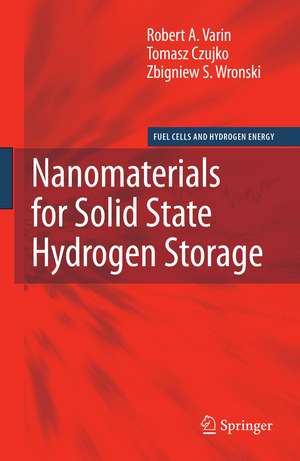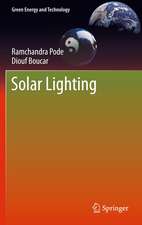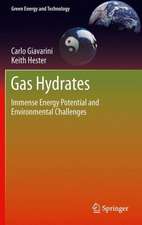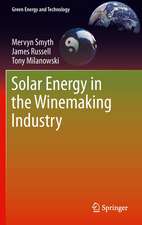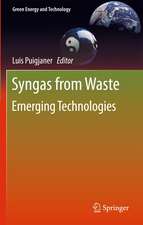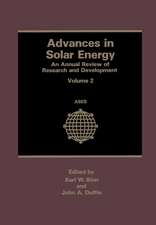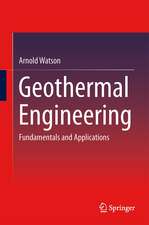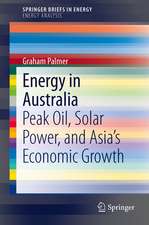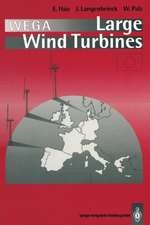Nanomaterials for Solid State Hydrogen Storage: Fuel Cells and Hydrogen Energy
Autor Robert A. Varin, Tomasz Czujko, Zbigniew S. Wronskien Limba Engleză Hardback – 18 dec 2008
Written by leading experts in the field, Nanomaterials for Solid State Hydrogen Storage provides a thorough history of hydrides and nanomaterials, followed by a discussion of existing fabrication methods. The authors’ own research results in the behavior of various hydrogen storage materials are also presented. Covering fundamentals, extensive research results and recent advances in nanomaterials for solid state hydrogen storage, this book serves as a comprehensive reference.
| Toate formatele și edițiile | Preț | Express |
|---|---|---|
| Paperback (1) | 947.04 lei 6-8 săpt. | |
| Springer Us – 19 noi 2010 | 947.04 lei 6-8 săpt. | |
| Hardback (1) | 951.29 lei 6-8 săpt. | |
| Springer Us – 18 dec 2008 | 951.29 lei 6-8 săpt. |
Preț: 951.29 lei
Preț vechi: 1160.10 lei
-18% Nou
Puncte Express: 1427
Preț estimativ în valută:
182.02€ • 190.56$ • 150.62£
182.02€ • 190.56$ • 150.62£
Carte tipărită la comandă
Livrare economică 07-21 aprilie
Preluare comenzi: 021 569.72.76
Specificații
ISBN-13: 9780387777115
ISBN-10: 0387777113
Pagini: 338
Ilustrații: X, 338 p.
Dimensiuni: 155 x 235 x 20 mm
Greutate: 0.61 kg
Ediția:2009
Editura: Springer Us
Colecția Springer
Seria Fuel Cells and Hydrogen Energy
Locul publicării:New York, NY, United States
ISBN-10: 0387777113
Pagini: 338
Ilustrații: X, 338 p.
Dimensiuni: 155 x 235 x 20 mm
Greutate: 0.61 kg
Ediția:2009
Editura: Springer Us
Colecția Springer
Seria Fuel Cells and Hydrogen Energy
Locul publicării:New York, NY, United States
Public țintă
ResearchCuprins
INTRODUCTION. Motivation: The Hydrogen Economy. Brief, synchronic history of development of hydrides and nanomaterials. Nanoprocessing in solid-state in high energy ball mills. Important hydride properties and experimental techniques.- SIMPLE METAL AND INTERMETALLIC HYDRIDES. Mg/MgH2. Mg/MgH2 with catalytic additives. Other metal hydrides containing Mg. AlH3. Other metal and intermetallic-based hydrides-new developments.- COMPLEX HYDRIDES. Ternary transition metal complex hydrides. Alanates. Amides. Metal borohydrides. Destabilization of high desorption temperature hydrides by (nano)compositing.- CARBONS AND NANOCARBONS. Diamond and nanodiamonds. Graphene, ordered graphite and nanographites. Disordered and active carbons. Highly-ordered fullerenes, carbon nanotubes, and other nanoshapes.
Textul de pe ultima copertă
Over the past decade, important advances have been made in the development of nanostructured materials for solid state hydrogen storage. The stored hydrogen will be used in fuel cells for generation of electricity in a clean, inexpensive, safe and efficient manner. Nanomaterials for Solid State Hydrogen Storage focuses on nanomaterials having high volumetric and gravimetric hydrogen storage capacities, and thus having the highest potential of being applied in the automotive sector.
Written by leading experts in the field, Nanomaterials for Solid State Hydrogen Storage provides a thorough history of hydrides and nanomaterials, followed by a discussion of existing fabrication methods. The authors’ own research results on the behavior of various hydrogen storage materials are also presented. Covering fundamentals, extensive research results and recent advances in nanomaterials for solid state hydrogen storage, this book serves as a comprehensive reference.
Written by leading experts in the field, Nanomaterials for Solid State Hydrogen Storage provides a thorough history of hydrides and nanomaterials, followed by a discussion of existing fabrication methods. The authors’ own research results on the behavior of various hydrogen storage materials are also presented. Covering fundamentals, extensive research results and recent advances in nanomaterials for solid state hydrogen storage, this book serves as a comprehensive reference.
Caracteristici
Reviews a huge mass of research results from leading laboratories in the world Relates in a quantitative way the microstructure of nanomaterials with their experimentally observed hydrogen storage properties Provides an overview of existing fabrication methods of nanomaterials for solid state hydrogen storage Compiles the various physical/chemical properties of hydrides which are now randomly scattered in the literature
